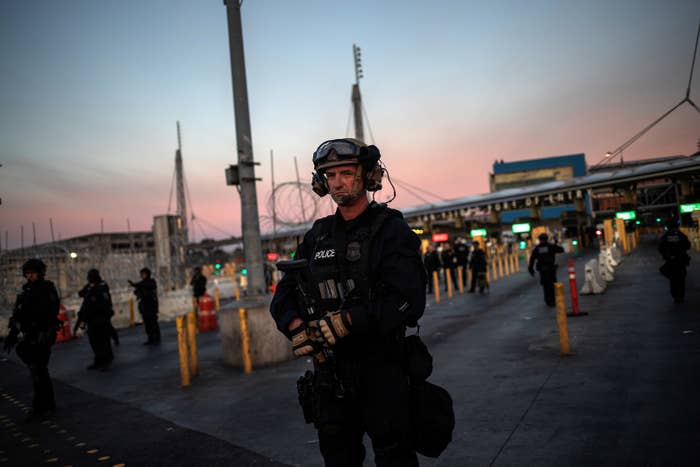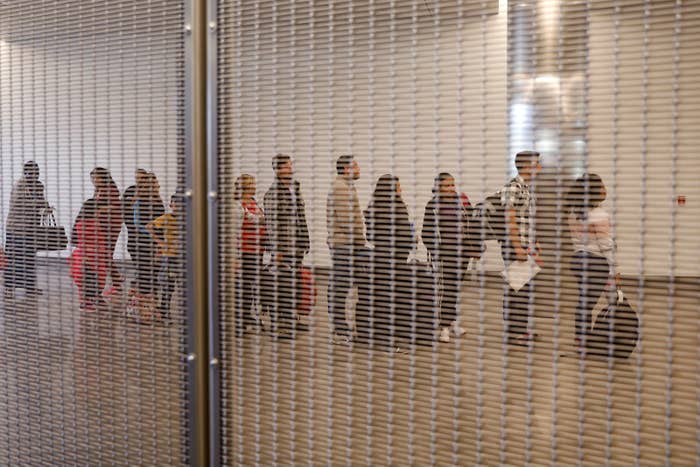
A federal judge in San Francisco on Monday questioned the legality of the Trump administration’s new restrictions on asylum-seekers, suggesting to government attorneys that the new regulations undermined Congress’s message when it passed legislation on who can apply for asylum.
At one point during the hearing, US District Judge Jon Tigar, who was nominated to the court by former president Barack Obama, asked Department of Justice attorney Scott Stewart that if the Immigration and Nationality Act states that all individuals can apply for asylum regardless of where they enter the United States, but the administration’s policy blocks those who enter illegally from receiving asylum, then “what’s left of that expression of congressional intent?”

Stewart responded that Congress had allowed for some factors, such as a serious criminal record, to block someone from asylum eligibility. But Tigar noted that none of the conditions Congress spelled out as potentially blocking a person’s eligibility for asylum had anything to do with whether they entered at a port of entry.
Tigar did not rule immediately on a motion by the American Civil Liberties Union that he block the administration’s new rule, which was imposed Nov. 9.
Government attorneys maintained at the hearing that the new policy was needed because a crush of asylum-seekers on the southern border had created a crisis. ACLU attorneys argued that the policy violated the law and was unnecessary.
The lawsuit against the policy is just the latest in a string of legal challenges to Trump administration efforts to reshape the immigration system that began just days after Trump’s inauguration when he attempted to bar citizens from Muslim countries from entering the US. That executive order was blocked by a number of federal judges, and was revised twice, before finally being allowed to go into effect by the Supreme Court.
Tigar raised a number of questions during Monday’s hearing about the reasons the administration has offered for the new policy. He asked whether the new restriction on where asylum-seekers must cross the border undermined the Immigration and Nationality Act, which sets the conditions for asylum. He questioned whether the underlying evidence supported the need for such a policy. He also wondered whether the policy would affect negotiations with Mexico over allowing individuals to gain asylum there.
Tigar also raised questions about the government’s practice of “metering” asylum claims at the border, a reference to a US practice that limits the number of asylum applicants according to the capacity of a port of entry. He seemed troubled that the new policy would actually allow fewer options, not more, for where a migrant could request asylum.
“Isn’t that inconsistent with the stated goal?” Tigar asked about government claims that limiting asylum-seekers to ports of entry would result in a more orderly process.
In early November, President Trump signed a proclamation intended to limit granting asylum only to people who present themselves at a port of entry, as opposed to crossing into the United States anywhere along the Mexican border and then seeking asylum from any Border Patrol agent they encountered. The order directed administration officials to recommend within 90 days whether the policy should continue.
The ACLU’s lawsuit asserts that the administration’s policy violates the Immigration and Nationality Act, which states that anyone who enters the United States, regardless of whether it is at a port of entry or not, can apply for asylum. The group also claims that the administration rushed the regulatory process to institute sweeping changes without going through the usual system that allows for public comment before a new rule is implemented.
“The administration is trying to override what Congress has done,” said Lee Gelernt, an attorney with the ACLU, in court. “Contrary to the narrative, these are not all criminals or cartel members coming here, these are families. This is a real humanitarian crisis.”
Gelernt said that certain unaccompanied children at the border had been unable to file asylum claims because authorities required them to have a legal guardian or parent with them.
The government justified the accelerated process used to institute the new policy by saying that there was a crisis at the border and that asylum was a “discretionary” benefit.
Toward the end of the hearing, Stewart, the Department of Justice attorney, said that the government wants Tigar not to block the policy but that if he did, it should be only for the clients of the advocacy organizations that were listed as plaintiffs in the case.
Tigar seemed dismissive of such a request, saying that such a targeted order would make the organizations the most popular law firms at the border.
“How’s that going to work?” he said.
